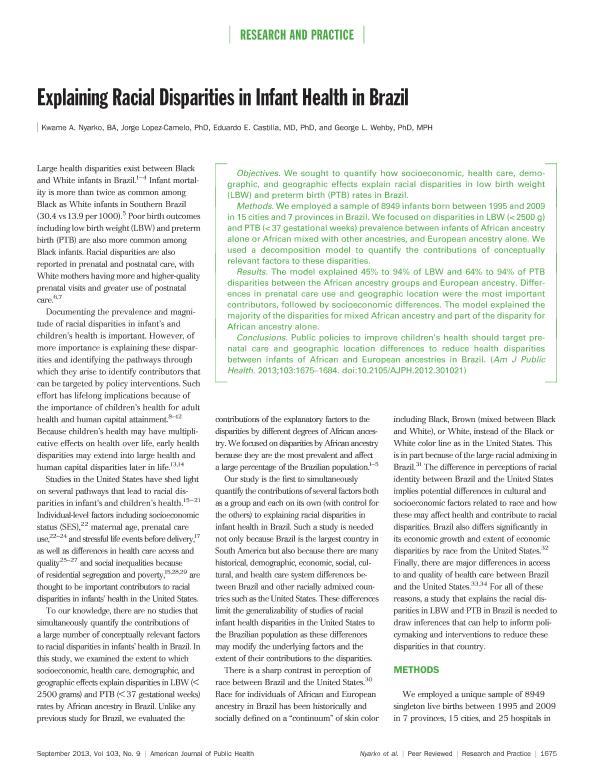Mostrar el registro sencillo del ítem
dc.contributor.author
Nyarko, Kwame A.
dc.contributor.author
López Camelo, Jorge Santiago

dc.contributor.author
Castilla, Eduardo Enrique

dc.contributor.author
Wehby, George L.
dc.date.available
2018-01-17T20:45:13Z
dc.date.issued
2013-09
dc.identifier.citation
Nyarko, Kwame A.; López Camelo, Jorge Santiago; Castilla, Eduardo Enrique; Wehby, George L.; Explaining Racial Disparities in Infant Health in Brazil; American Public Health Association; American Journal Of Public Health; 103; 9; 9-2013; 1675-1684
dc.identifier.issn
0090-0036
dc.identifier.uri
http://hdl.handle.net/11336/33710
dc.description.abstract
OBJECTIVES: We sought to quantify how socioeconomic, health care, demographic, and geographic effects explain racial disparities in low birth weight (LBW) and preterm birth (PTB) rates in Brazil.
METHODS: We employed a sample of 8949 infants born between 1995 and 2009 in 15 cities and 7 provinces in Brazil. We focused on disparities in LBW (< 2500 g) and PTB (< 37 gestational weeks) prevalence between infants of African ancestry alone or African mixed with other ancestries, and European ancestry alone. We used a decomposition model to quantify the contributions of conceptually relevant factors to these disparities.
RESULTS: The model explained 45% to 94% of LBW and 64% to 94% of PTB disparities between the African ancestry groups and European ancestry. Differences in prenatal care use and geographic location were the most important contributors, followed by socioeconomic differences. The model explained the majority of the disparities for mixed African ancestry and part of the disparity for African ancestry alone.
CONCLUSIONS: Public policies to improve children's health should target prenatal care and geographic location differences to reduce health disparities between infants of African and European ancestries in Brazil.
dc.format
application/pdf
dc.language.iso
eng
dc.publisher
American Public Health Association

dc.rights
info:eu-repo/semantics/openAccess
dc.rights.uri
https://creativecommons.org/licenses/by-nc-sa/2.5/ar/
dc.subject
Disparidad Racial en Salud
dc.subject
Salud Infantil
dc.subject
Brasil
dc.subject.classification
Salud Ocupacional

dc.subject.classification
Ciencias de la Salud

dc.subject.classification
CIENCIAS MÉDICAS Y DE LA SALUD

dc.title
Explaining Racial Disparities in Infant Health in Brazil
dc.type
info:eu-repo/semantics/article
dc.type
info:ar-repo/semantics/artículo
dc.type
info:eu-repo/semantics/publishedVersion
dc.date.updated
2018-01-16T18:05:42Z
dc.identifier.eissn
1541-0048
dc.journal.volume
103
dc.journal.number
9
dc.journal.pagination
1675-1684
dc.journal.pais
Estados Unidos

dc.journal.ciudad
Washington, DC
dc.description.fil
Fil: Nyarko, Kwame A.. University of Iowa; Estados Unidos
dc.description.fil
Fil: López Camelo, Jorge Santiago. Consejo Nacional de Investigaciones Científicas y Técnicas. Oficina de Coordinación Administrativa Parque Centenario. CEMIC-CONICET. Centro de Educaciones Médicas e Investigaciones Clínicas "Norberto Quirno". CEMIC-CONICET.; Argentina. Instituto Oswaldo Cruz; Brasil
dc.description.fil
Fil: Castilla, Eduardo Enrique. Consejo Nacional de Investigaciones Científicas y Técnicas. Oficina de Coordinación Administrativa Parque Centenario. CEMIC-CONICET. Centro de Educaciones Médicas e Investigaciones Clínicas "Norberto Quirno". CEMIC-CONICET.; Argentina. Instituto Oswaldo Cruz; Brasil
dc.description.fil
Fil: Wehby, George L.. University of Iowa; Estados Unidos
dc.journal.title
American Journal Of Public Health

dc.relation.alternativeid
info:eu-repo/semantics/altIdentifier/doi/http://dx.doi.org/10.2105/AJPH.2012.301021
dc.relation.alternativeid
info:eu-repo/semantics/altIdentifier/url/http://ajph.aphapublications.org/doi/10.2105/AJPH.2012.301021
Archivos asociados
